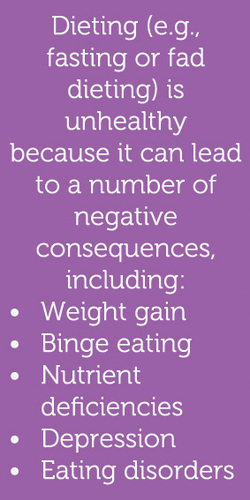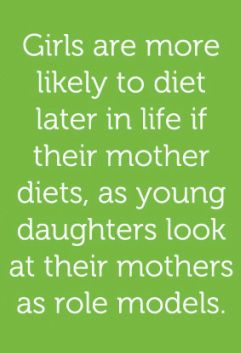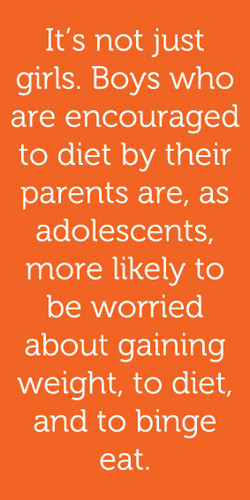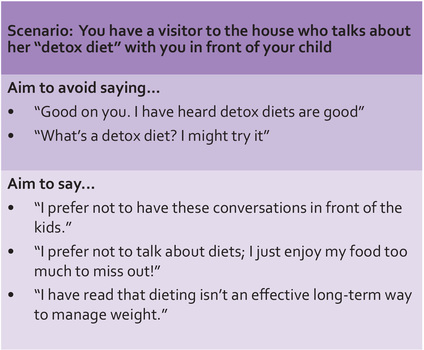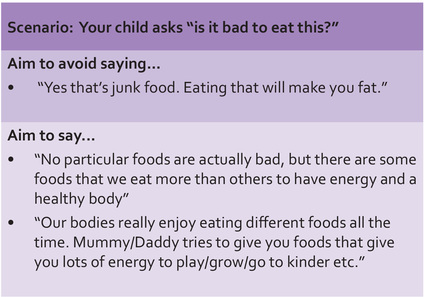why is having someone dieting in my home a problem?
_ _ _ _ _ _ _ _ _ _ _ _ _ _ _ _ _ _ _ _ _ _ _ _ _ _ _ _ _ _ _ _ _ _ _ _ _ _ _ _ _ _ _ _ _ _ _ _ _
|
Dieting is the restriction of food in general, or of particular types of food, for the specific purpose of losing weight. Did you know that dieting isn’t a healthy eating behaviour? (Click here for an explanation of healthy eating)
You may be wondering why this is important for your child. Although it’s unlikely your child will want to diet at this young age, seeing important people in their lives (like you) diet may lead them to believe that when they grow up, they should diet. Or your child may grow up thinking the body can be easily changed by restricting what they eat, which is not a healthy attitude to have. Children’s attitudes towards dieting and dieting behaviours can be strongly influenced by the people around them. Having a parent, family member, or friend who diets can place a child at risk of wanting to diet in the near future, and possibly even developing an eating disorder. This is because dieting is a strong risk factor for developing an eating disorder, weight cycling and unhealthy risk taking behaviours (such as using supplements for weight loss). 
In particular, research has found that having a parent who diets, or a child perceiving their parent to be dieting (i.e. parents talking about dieting or weight loss in front of their child), increases the likelihood of the child being dissatisfied with their own body and engaging in unhealthy eating or weight control behaviours later in life, which may lead to an eating disorder or other negative outcomes.
Therefore, the more a child is exposed to dieting, or the idea of dieting, the greater their chance of these problems later in life. One reason for a child wanting to diet, if a parent or important other person diets, is because children tend to copy their parents’ behaviours, whether they are healthy or unhealthy. Dieting may also demonstrate to a child a preoccupation with weight in the family, which the child may then take on board. |
_ _ _ _ _ _ _ _ _ _ _ _ _ _ _ _ _ _ _ _ _ _ _ _ _ _ _ _ _ _ _ _ _ _ _ _ _ _ _ _ _ _ _ _ _ _ _ _
Tips for parents
_ _ _ _ _ _ _ _ _ _ _ _ _ _ _ _ _ _ _ _ _ _ _ _ _ _ _ _ _ _ _ _ _ _ _ _ _ _ _ _ _ _ _ _ _ _ _ _
• When talking about food and eating, focus on the importance of being healthy and the enjoyment of eating, rather than how
food can affect your weight or shape.
• Be mindful of the amount of time you spend talking about food and eating. Also, minimise the emphasis placed on food and
eating where possible, particularly in relation to body weight and shape.
• Make your home a diet-free household. Instead encourage a balance of healthy eating and physical activity patterns.
• Try not to diet and avoid talking about dieting, calories, and weight, as this may encourage similar behaviours in your child.
• Try to avoid applying strict rules to your own and your child’s eating habits and food intake.
• Avoid labelling some foods as ‘good’ or ‘bad’, as your child may desire the ‘bad’ foods more and feel guilty when they are
eaten.
• Discourage your child from believing that losing weight will lead to an improved sense of self-worth, value, and loveability.
• Don’t encourage your child to lose weight by dieting. Dieting is dangerous for young children and increases their risk of disordered eating. If you are concerned about your child’s weight, please visit the parental concerns page.
food can affect your weight or shape.
• Be mindful of the amount of time you spend talking about food and eating. Also, minimise the emphasis placed on food and
eating where possible, particularly in relation to body weight and shape.
• Make your home a diet-free household. Instead encourage a balance of healthy eating and physical activity patterns.
• Try not to diet and avoid talking about dieting, calories, and weight, as this may encourage similar behaviours in your child.
• Try to avoid applying strict rules to your own and your child’s eating habits and food intake.
• Avoid labelling some foods as ‘good’ or ‘bad’, as your child may desire the ‘bad’ foods more and feel guilty when they are
eaten.
• Discourage your child from believing that losing weight will lead to an improved sense of self-worth, value, and loveability.
• Don’t encourage your child to lose weight by dieting. Dieting is dangerous for young children and increases their risk of disordered eating. If you are concerned about your child’s weight, please visit the parental concerns page.

